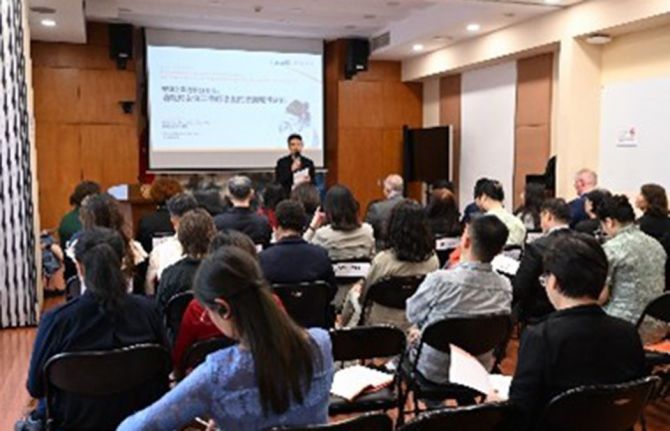

Feature Story
Women living with HIV in China unite to confront discrimination
14 October 2024
14 October 2024 14 October 2024There are around 1.4 million people living with HIV in China and women make up around 23.7% of them, according to the latest data from Chinese health authorities. Among those living with HIV are pregnant women who are in a particularly vulnerable position due to the stigma surrounding the disease.
In order to counter such stigma and discrimination, women living with HIV and Hepatitis B came together at The Voice of Resilience event to tell their stories and to call for additional resources for community-based organizations (CBOs) working on the frontlines providing services for women living with and affected by HIV.
In 2023 alone, more than 5,000 pregnant women were diagnosed with HIV and over 400,000 with hepatitis B, and some of them were diagnosed at very late stage to be able to receive HIV services to prevent transmission to their children, according to China’s National Health Commission. Even though services are in place to prevent the transmission of HIV to their babies, discrimination, including denial of healthcare, obstructs women from accessing such services.
“I received a call from the doctor telling me that I couldn’t receive services from their hospital because I was HIV positive,” explained Xia Jing, one of the mothers, after she went to a general hospital in Beijing for a routine maternal exam. She still cannot hold her tears when she remembers her traumatic experience. She challenged back and told the doctor r that under the law they had no right to reject her.
She was eventually referred to Beijing’s You’an Hospital, a designated hospital for infectious diseases and people living with HIV where she delivered her baby. Now she is a happy mother of a four-year-old boy. Doctor Zhu Yunxia was the doctor who helped Jing deliver her baby. Dedicated to her job for more than 30 years, she is proud of having helped so many women deliver healthy babies. She calls for empathy with people facing discrimination and unfair treatment and urges all people to look at women living with HIV without prejudice.
“Stigma undermines public health objectives by creating barriers to accessing health and social services and can reduce the quality of the services that members of affected communities receive,” said Mark Vcislo, the First Secretary at Canadian Embassy to China, which has supported the work to tackle stigma. He called for breaking down “the prejudices that can prevent and deter marginalized communities, including persons living with HIV, from accessing the health and social services they need and deserve.”
Community-based organizations (CBO) are vital support for women living with HIV. Sister Xin, for instance, who herself received help from community volunteers when she was first diagnosed with HIV, created Firefly, a community-based organization that has help more than 20,000 women living with HIV in the last 20 years. Zhang Yu whose CBO supports women living with HIV in rural areas of China’s southwestern Yunnan Province, called for more resources for CBO’s work. “CBOs are struggling with their survival due to lack of resources,” she said. “I sincerely hope the government, the charity organizations and everybody can support us to continue our work.”
China has developed a strong and ambitious plan to significantly reduce the transmission rates of HIV, syphilis, and hepatitis B by 2025 outlined in China Women’s Development Plan and Healthy China 2030. China has achieved around 99 percent national screening rates among pregnant women living with HIV over the past five years. In 2023 alone, more than 9 million pregnant women have received HIV testing services.
The Chinese government has partnered with UN agencies for the “last mile” by building a patient-centred and family-centred community service model to enable a holistic set of services and help break the barriers for both mothers and infants.
“Thanks to the combination of development of technology and social progress, women living with HIV can today give birth to healthy babies,” said Sister Xin.
Read the profile of the storytellers and more unsung community heroes committed to helping mothers and babies: http://www.unaids.org.cn/page122?_l=en&article_id=1233.



